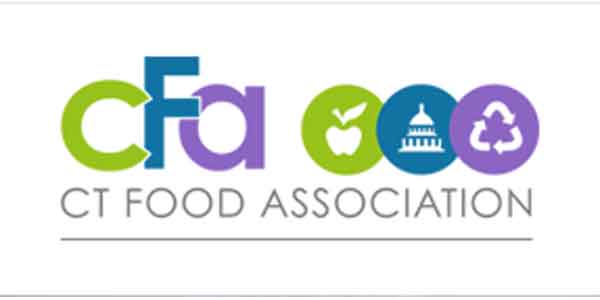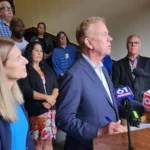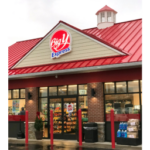After several failed attempts, a new push to explore a city-owned grocery store aims to someday bring fresh produce to a food desert in Hartford.
“Getting a full-service grocery store in the North End has been a challenge for literally our whole lives,” councilman Josh Michtom said. “I think it’s a very common sense idea to at least study its feasibility and get some parameters around it.”
Hartford’s city council voted Monday to approve a resolution that calls on the city’s director of Development Services to hire an outside firm to explore the costs of operating a grocery store for both profit, on a break-even basis, or at a loss. While the city has previously offered financial incentives to grocery store operators to locate within the city, there has never been a city-owned and city-operated store. Michtom, along with councilwoman Tiana Hercules, both members of the Connecticut Working Families Party, first introduced the resolution to kickstart a study on the feasibility of a city-owned and operated grocery store.
“This resolution really came as a response to the idea that grocery stores have failed because they are not profitable in the North End,” Hercules said. “The solution is to put a dent in food disparity regardless of profit. That’s why the city is named as an operator in the resolution. So what about the constant messaging that grocery stores are not profitable? Let’s take profit out of the equation and actually do something about this problem.”
As part of the resolution, the director of Development Services has six months to report the study’s findings back to the council. Majority Leader Thomas “TJ” Clarke said that his hope is that the study will be completed well within that timeframe to have the report ready by the time a new mayor is sworn in next year. Mayor Luke Bronin is not seeking re-election.
“It’s long past time,” councilman Nick Lebron said. “I grew up in the North End of Hartford without a grocery store since I was a child. For me, being on city council and seeing the city side of it, is that there’s a lot of reasons and studies why there isn’t one, but at the end of the day we need to just get it done. So whatever mechanisms we can press on the city side to quicken those efforts, then that’s what we have to do.”
For a city of approximately 125,000 residents, getting access to healthy and fresh food means having to travel outside the city’s borders to neighboring wealthier communities. Transportation is often a barrier to access as 35% of households in the city do not own cars, according to state data.
But the city as a whole, like many urban food deserts around the country, has seen an exodus of grocery store chains over the last 50 years. In 1968, Hartford had 13 chain-owned supermarkets. By 1984, the number was just two — Stop & Shop and a Finast supermarket on New Britain Avenue, according to a previous Courant article. Finast in 1993 turned into Edwards Super Foods across the line on Kane Street in West Hartford. Edwards was bought out in 1996.
“The only full-service grocery store located within the city limits today is located on the western border and that is Stop & Shop,” said Denise Holter, chair of healthy Hartford hub’s community action task force, at a recent Health and Human Services committee meeting. “For a city of its size, Hartford recently ranked eighth worst in the United States for providing access to healthy and affordable food for its residents.”
Over the last two decades, only one grocery store has opened in the city, but it closed less than a year after opening back in 2011. In contrast, neighboring Glastonbury, with a smaller population of just 35,000 in the 2020 census, has more than five major chain grocery stores, according to Google Maps data.
“Research has confirmed that residents of the North Hartford Promise Zone face the most significant barriers to health in the Greater Hartford region, including significantly higher rates of food insecurity,” Holter said. Healthy Hartford Hub, an advocacy group organized to bring a grocery store for residents of the North End, has said the group is encouraged by the council proposal. HHH has advocated for a grocery store to open at the intersection of Main and Albany near Dunkin’ Park, since studies have indicated that area represents the most accessible for residents, according to the group’s Facebook page.
But while the resolution was approved by the city council, some members acknowledged the challenges of a city-owned grocery store.
“While people may say just open a grocery store, there’s a lot of factors that go into it,” Councilman John Gale said. “It’s not rocket science, but it’s not as easy as just opening up the doors and putting lettuce on the shelf.”
Gale, who is a member of the HHS committee, said at the committee meeting that he thinks the council should consider all options rather than just focusing on a city-owned store. Grocery stores operate under razor-thin profit margins and often open after years of costly market research, according to Gale.
“We wouldn’t want to just limit ourselves to city-owned if other ideas popped up,” Gale said. “I know the possibility of bringing in a bona fide operator has been examined again and again. It’s not that I want to reinvent the wheel but I don’t want to foreclose other options, like a co-op, for instance.”
The city previously had a co-op called Our Store, which opened in 1985 and closed less than two years later, according to a previous Courant article. Grocery co-ops are independent and owned by community members who shop there, unlike large chains with investors.
Original article found at Yahoo News.


